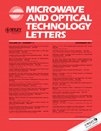Boundary condition for the efficient excitation and absorption of hybrid waveguide modes in finite element formulations
Abstract
A boundary condition capable of efficiently exciting and absorbing hybrid waveguide modes is derived for use in the context of the finite element method.Its performance is assessed in two cases, that is, a silicon and a plasmonic waveguide, and compared with that of the standard absorbing boundary condition. © 2011 Wiley Periodicals, Inc. Microwave Opt Technol Lett 53:2626–2631, 2011; View this article online at wileyonlinelibrary.com. DOI 10.1002/mop.26364




